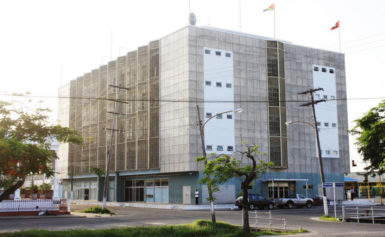While the risk-averse nature of commercial banks’ lending policies have helped to keep the country’s financial system viable and sound in the face of banking crises in other countries, “rigid central bank restrictions” on commercial bank lending have limited expansion, the Private Sector Commission (PSC) says.
Local commercial banks have come under pressure particularly from the small business sector for what businesses say are lending criteria that invariably deny them borrowing access though the PSC, in response to a question put to it by this newspaper insists that it is mindful of the importance of the lending provisions of commercial banks, by central bank oversight, based on proper business proposals and risk assessment.
However, the PSC concedes that “rigid central bank restrictions on lending… limits the expansion of the private sector.” Accordingly, the PSC says it believes that in the context of private sector growth a development bank is still relevant today.
The private sector body’s cautious endorsement of a role for a development bank in the growth and development of the local private sector comes despite its stated misgivings about the track record of the institution. It notes that “governments in many countries have had to write off huge sums for misjudged risks and, in fact, exploitation of the concept of a government development bank.” The PSC says, meanwhile, that it is “in touch with revamped private sector arms of the World Bank and the Inter-American Development Bank on the issue of private sector borrowing” though it says that local potential borrowers will still have to face the reality that efforts to borrow from these institutions will confront them with minimum lending limits that are “beyond the capacity of even most of our larger businesses.”

The commission says, however, that it understands that at least one of the World Bank-affiliated lending institutions has revised its policy “and we are hopeful of more direct borrowing from these institutions as commercial banks retain their central bank restrictions on lending.”
In its communication with the Stabroek Business, the PSC also alluded to the high rate of corporate taxes and high energy costs, issues which it says also contribute to a negative impact on the competitiveness of the Guyana private sector.
But the local business support body says that while the financing and energy problems may require some time to be remedied the corporate tax rate represents “low hanging fruit since the government can adjust this by decree.”
In a written submission made to this newspaper in response to questions put to it recently, the PSC alluded to a study it commissioned, which was undertaken by a Canadian consultant with a view to determining the corporate tax rate as against revenues from corporate taxation. “The consultant prepared a report which posited that, if the rate of corporate taxes was reduced, the net impact on government revenue would be positive,” the PSC says, asserting that this was borne out when the rate was reduced by 5% and revenues from the tax increased by $3 billion in the first year of the application of the new rate.
What the private sector has said are tax rates that continue to strangle the competitiveness of the local manufacturing sector, particularly, has been one of the primary issues on the public/private sector agenda for several years though a definitive agreement on downward adjustment is yet to be reached.









